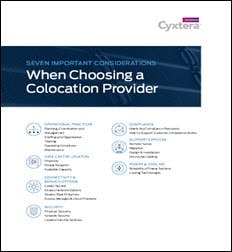Can Your Colocation Provider Ensure Physical and Virtual Security?
This is the third post in a four-part series from Cyxtera that explores the seven most crucial elements to consider before choosing a colocation provider. This post focuses on ensuring your colocation provider is prepared to ensure physical and virtual security for your data.
Download the full report.
As you design your environment to be secure, don’t forget the importance of physical security measures in the data center. Your provider should use current technologies like biometric scanners, card readers and video surveillance, as well as mantraps to prevent unauthorized access. People add a layer of security, too; providers that staff their centers 24/7 with trained security personnel instead of relying solely on automated systems offer an important extra layer of protection.
Beyond the physical security of the center, look for providers that can address your virtual security needs, as well. This includes the ability to secure user access to all parts of your hybrid infrastructure. Qualified providers should offer tools and virtual security strategies that granularly control who can use and manage applications and infrastructure rather than granting connectivity to an IP address and port number. Look for a provider that can test, evaluate and remediate security vulnerabilities with services like Software Defined Parameter (SDP), threat analytics, and professional services. This will help you decrease your attack service and increase your ability to withstand intrusions at your center’s most vulnerable point: ingress and egress via its network.
Does my Colocation Provider Meet the Compliance?
The data centers should be compliant with SSAE 18 SOC 1 controls. Your provider also should be compliant with any regulatory requirements for your industry and know the ins and outs in a continually shifting regulatory environment. Publicly traded companies should seek providers that meet SOX. Any company providing ecommerce needs to meet PCI security standards.
[clickToTweet tweet=”Don’t forget the importance of physical security measures in the data center. #colocation” quote=”Don’t forget the importance of physical security measures in the data center. #colocation”]
If you are in an industry that requires specific compliance credentials such as FISMA and NIST in the U.S. Federal government or HIPAA and HYTRUST for healthcare providers, make sure your provider can meet these stringent requirements. In addition to looking for the appropriate physical site security controls, assure your provider is ready, willing, able to support you during your compliance audit. Can they produce the needed attestation of compliance and facilitate data center access for your auditors, as necessary?
What are the Power and Cooling Capabilities of the Center that will House My Equipment?
Power is a critical data center element, so look for a provider that has 100 percent uptime SLA for power and redundant power systems. Providers that can offer this assurance have engineered then N+1 or better systems with concurrently maintainable power resources, so they provide uninterrupted power during both routine maintenance and when any power source is brought offline. The provider should be able to not only deliver the power you need today, but also meet your future needs. Providers that cannot adequately power their space will limit your options as you seek to grow your colocation installation or migrate to new servers with higher power requirements.
Your provider should offer transparency and detail in its billing. Providers that offer options for billing your power based upon distribution of power circuits, or metered power, can help reduce your costs depending on your configuration and power requirements.
Server power demands are increasing, and so is the power consumption in today’s high-density server environments. It is important that the center includes efficient cooling systems, and the provider continues to invest in new cooling technologies to protect your hardware. Look for cooling techniques like hot and cold aisles that provide a front-to-back cooling profile with blanking plates. Proper air containment designs and cooling walls promote cooling and can help avoid hot-spots in your cage. Improved cooling also can extend the life of your equipment and improve performance by reducing hardware failures.
Make sure the center meets your required standard ranges for temperature and hardware failures. Make sure the center meets your required standard ranges for temperature and humidity. A provider that can participate with you to integrate cooling techniques into the design, operation or upgrading of your environment can help you promote the green initiatives of your company.
Over the next few weeks, this series will also cover the following topics:
- Does Your Colocation Provider Have the Methods to Ensure Maximum Uptime?
- Data Center Proximity: How Close is my Colocation Provider’s Facility?
- Colocation Provider Support: How to Choose Your Partner
You can download the full report here, courtesy of Cyxtera, “Seven Important Considerations When Choosing a Colocation Provider.”



